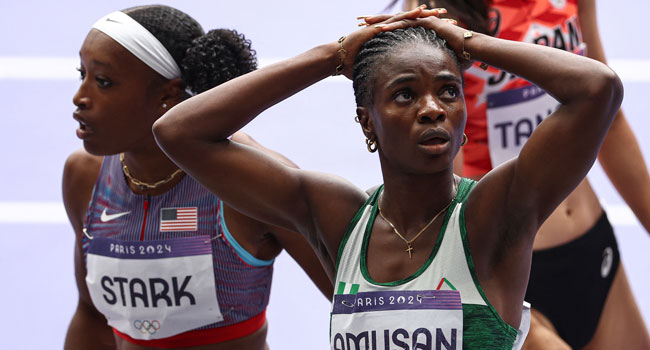Nigeria’s journey at the 2024 Paris Olympics ended without a single medal, marking a disappointing return to the global stage for the West African nation.
The final blow came on Saturday when Hannah Reuben lost her Women’s Freestyle 76kg bout, dashing the country’s last hopes of making the podium. Reuben was defeated 5-2 by Mongolia’s Enkh-Amaryn Davaanasan in the round of 16, capping off a lackluster showing for Team Nigeria.
Despite a strong build-up to the Games, with high expectations based on solid performances in qualifying events, Nigeria failed to translate its continental dominance into Olympic success.
The country registered for 12 events but like in previous Olympics, struggled to make a mark, leading to a return home without any medals. This marks the first time Nigeria has ended an Olympics without a medal since the London 2012 Games.
The nation’s poor showing in Paris was not an isolated incident, as Nigeria has experienced similar outcomes in past Games, including the 1952 Helsinki, 1956 Melbourne, 1960 Rome, 1968 Mexico, 1980 Moscow, and 1988 Seoul Olympics.
President Bola Tinubu had approved a budget of N12 billion for Nigeria’s participation in both the Olympics and Paralympics, with N9 billion allocated for the former. Despite this significant investment, the results were disheartening.
Nigeria had placed high hopes on its track and field athletes, traditionally strong contenders for medals. Favour Ofili made history by becoming the first Nigerian to reach the 200m semi-finals since the Atlanta 1996 Olympics. However, despite her season-best time of 22.05 seconds, she failed to secure a spot on the podium.
Other track and field athletes also fell short. Udodi Chudi Onwuzurike and Ezekiel Nathaniel both reached the semi-finals in their respective events, the 200m and 400m hurdles, but could not advance further.
The men’s 4x400m relay team, which had been another source of hope, was disqualified for a lane violation, despite recording a season-best time in their heat.
World record holder Tobi Amusan, expected to be a strong medal contender in the women’s 100m hurdles, was unable to progress beyond the semi-finals. She finished third in her heat with a time of 12.55 seconds, missing out on both the automatic qualification and a spot as one of the best losers.
Even in the women’s long jump, where Nigeria had three finalists—Ese Brume, Ruth Usoro, and Prestina Ochonogor—the country was unable to secure a medal, despite making history with three athletes in the final.
READ ALSO: Nigeria’s 4x400m Men’s Relay Team Disqualified from Paris Olympics Final
Despite the overall disappointment, Nigeria’s D’Tigress basketball team provided a silver lining. The team made history by becoming the first African side, male or female, to reach the quarterfinals of the Olympics. Although they were ultimately defeated by the US in a spirited 88-74 performance, their achievement stood out as a rare bright spot in an otherwise disappointing campaign.
In response to Nigeria’s dismal performance, Minister of Sports Development, John Enoh, described the outcome as a “disaster” and pledged to address the issues that led to the nation’s failure in Paris. He emphasized the need for a comprehensive review of the country’s sports administration, particularly the election processes for leaders of various sporting federations.
“As we go back home, we must do everything to prevent future occurrences of the Paris disaster,” Enoh wrote on X (formerly Twitter). He highlighted the upcoming elections for sports federations as an opportunity to bring in more capable leaders, stressing that the poor performance at the Olympics is symptomatic of broader systemic issues that require immediate attention.
The Paris Olympics have left Nigeria with much to reflect on as the nation seeks to rebuild and avoid repeating the same mistakes in future international competitions.










